
We use cookies to improve your experience on our site. Please accept cookies for optimal performance.
Ahmedabad
July 1, 2023
iFour Technolab has hosted a Meetup titled “Exploring Docker - Basic to Advance” on 1st July 2023. The meetup was entirely focused on the core concepts of Docker, its benefits, best practices, and ways to make the most out of its virtualization.
Docker is basically a software framework used to build, deploy, and execute business applications using containers. Now what is a container? To put it simply, it is an isolated environment for your application code to help it run quickly and reliably. It includes all required libraries and dependencies.
The main aim of this meetup is to educate viewers on the importance of virtualization, how docker works, and how it separates applications from the company infrastructure to enable quick software delivery.
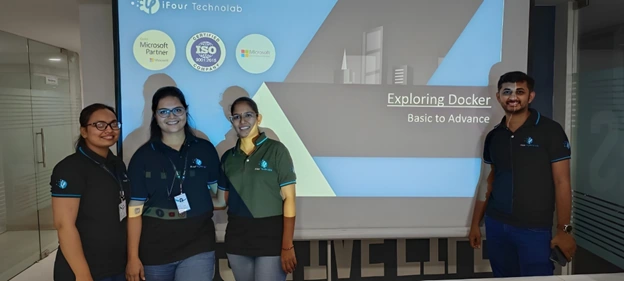
We were pretty excited about this session and as we gathered for this, our Office was buzzed with excitement. Everyone in the crowd was curious to learn what was new in this meetup. We were amazed to witness such passion, which led to this incredible success.
The Docker meetup was given by three of our diligent .NET experts: Divya Rathod, Monika Mistry, and Dipti Raval.
Our first expert, Divya Rathod, kicked things off by explaining what exactly is Virtualization, and what’s the exact difference between virtualization and containerization.
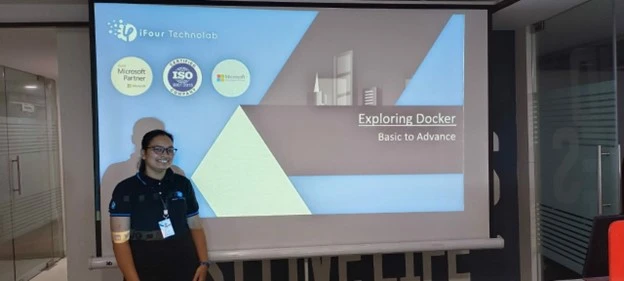
She says, “Virtualization is something that helps you create a virtual representation of your servers, computer networks, data storage, and other hardware devices. This technique perfectly replicates your underlying hardware and helps you execute applications of any Operating system.”
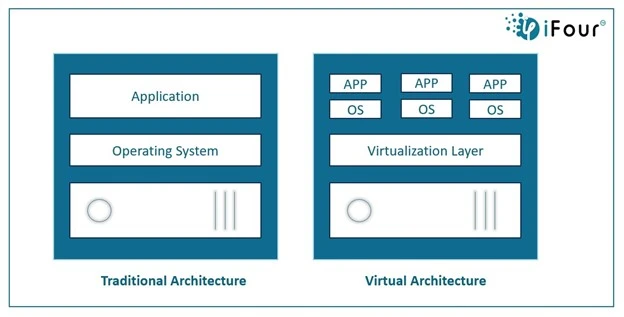
She then explained the core differences between virtualization and containerization to help everyone better grasp the concepts of Docker.
It left viewers more curious when Divya provided a full summary of Docker's features and essential components. She discussed the essential architecture of Docker, including all components, and demonstrated the flow in practice.
The architecture of Docker:
(1) Docker Client
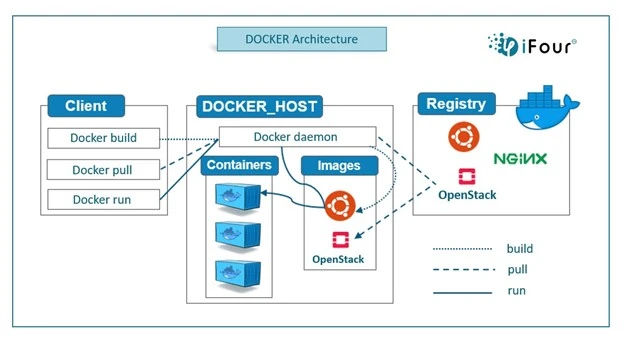
(2) Docker Host
A “Docker host” is basically a physical or virtual server on which the core component of Docker runs.
(3) Registry
The Registry is a server-side program that stores and distributes Docker images. It is stateless and extremely scalable.
(4) Docker Engine
The Docker engine encapsulates and runs workloads in Docker containers.
Our next .NET expert, Dipti Raval, took viewers into the fascinating world of Microservices with Docker. She provided her unique viewpoint to clarify the difference between basic Microservices and Docker-based Microservices.
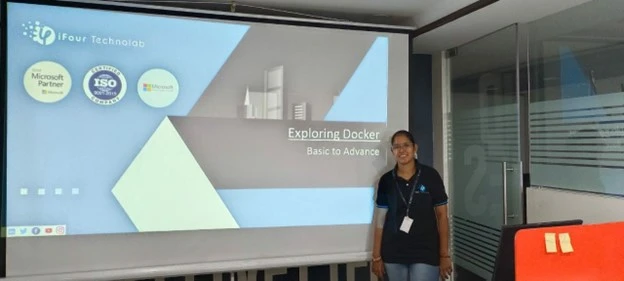
She explored the basics of Microservices, how it works, and what challenges Docker-based Microservices addresses.
What are Microservices?
She says “Microservices are a software architectural pattern in which applications are built as a set of small, independent services that communicate with each other via APIs. Each service is responsible for a specific function or feature and can be developed, deployed, and scaled independently.”
“You might have noticed in traditional architecture; a single function call would load and execute everything. And a minor fault in one place could disrupt other activities. However, using Microservices, you may get rid of all these challenges allowing your software to run smoothly.”
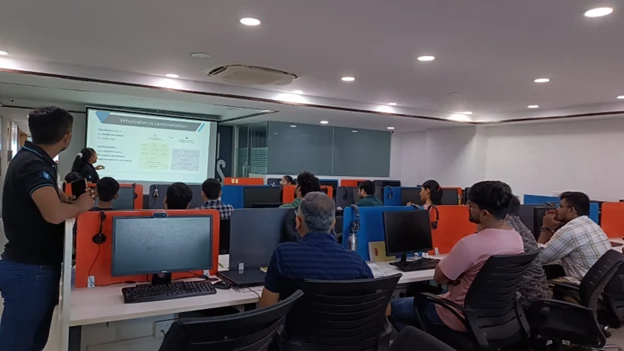
How does Docker help with Microservices?
Next up was Monika Mistry, who explored the secrets of Kubernetes. It wasn't just about the Application deployment; it was about Auto-scaling it in a whole new way.
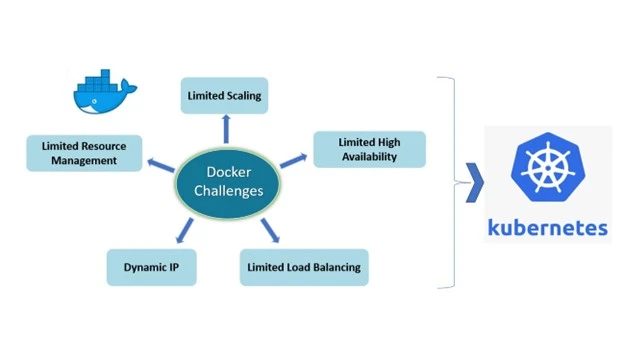
She says, “When it comes to scaling large applications, Docker Swarm has its limitations. In contrast, Kubernetes was designed from scratch to manage container orchestration at a large scale effectively.”
She took over the things by adding more about how Kubernetes addresses the Docker challenges with perfect examples.
Docker vs Kubernetes
Docker and Kubernetes differ from several perspectives like Healthcheck, Setup, Deployment, Autoscaling, Tolerance ratio, and their service providers.
She adds “Docker Swarm has limited resource management features, which can be a problem when running multiple applications on a cluster. Kubernetes provides more advanced resource management features, including automatic scaling and resource allocation.”
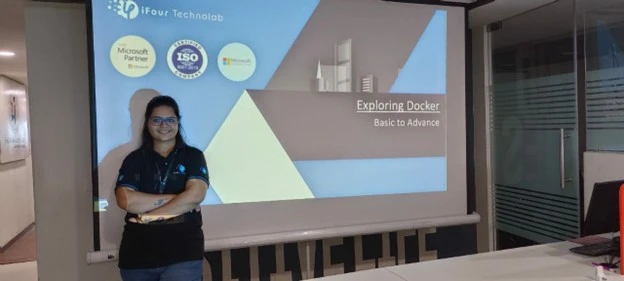
The viewers’ participation and knowledge sharing have been remarkable in this session. Many of them posed interesting questions and unveiled answers that strengthened our thoughts on the use of Docker for both custom software development and Azure DevOps CICD pipeline deployment.
In the meantime, Divya Rathod drove the discussion forward, shedding light on the latest innovations in Docker and its promising future. The atmosphere was electric, as each expert contributed their own distinctive touch to the narrative. They were not just listening; they were an integral part of our session uncovering the incredible possibilities of Docker.
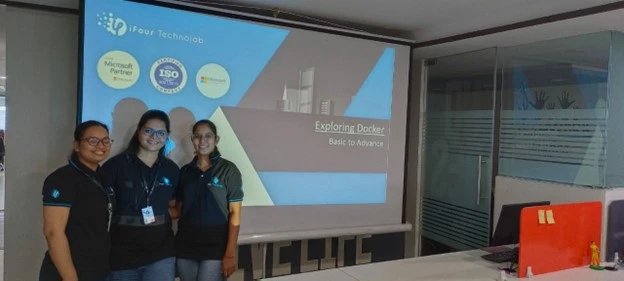
Closing the Docker Gateway
To conclude this Docker meetup, Mr. Krunal Patel, the Project Manager at iFour Technolab said – “It feels amazing to witness this fantastic meetup. It brought value to our efforts and time and revealed something that would help us simplify bespoke software development. This meetup was fantastic and educational, demonstrating real-time Docker use cases. Docker is a way for us to innovate and make processes better. So, adopt it and make the most out of it.
Thank you everyone for making this meetup wonderful and amazing with your presence. Have a nice day!”